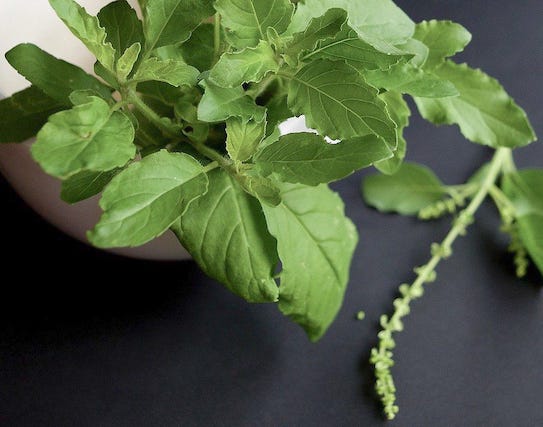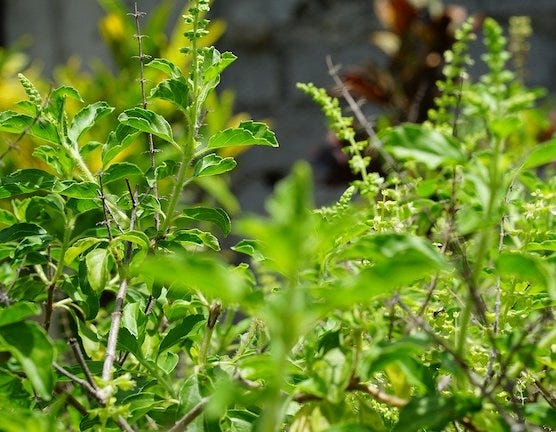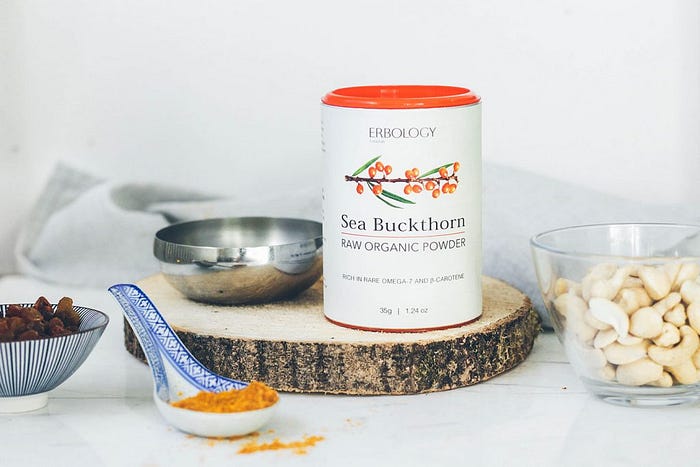In Ayurveda, tulsi, or holy basil, is known as the Queen of Herbs. Find out more about holy basil benefits, and about the insights Western science brings.
Tulsi within Hinduism, holy basil in a Western context
Do you know the Queen of Herbs? As you would hope a queen would be, she is timeless, magnificent, and dignified. Her abilities are such that the Taj Mahal is now surrounded by tulsi plants. This is because of the power of holy basil to reduce the effect of environmental pollution on this precious building. Ayurvedic practice and current research suggests that holy basil benefits each of us through diet.
There are several types of holy basil. Generally, the main two kinds are Krishna tulsi (black / purple) and white Vana, or wild, tulsi. Krishna tulsi is higher in the antioxidants that make this plant so powerful. Do not mistake holy basil for the other types of basil. They are members of the same family and genus. However, they are not the same species. Moreover, here is how sacred tulsi is to Hindus. Even the soil it grows in is seen as richer and stronger! Western science has now seen that the basis for this is the presence of good endophytic fungi in the soil. Meanwhile, in Ayurveda, all parts of the tulsi plant are healing.(1) Further, the different forms in which you can take tulsi are good for various purposes.
1. Holy basil benefits lowering of stress levels
These days, stress is one of these words which is used so often that it’s easy to forget the real meaning. To clarify, stress is a state of strain or tension resulting from adverse or demanding circumstances. Medically, the sources and effects of stress can be physical, emotional, or mental, to name a few possibilities.
Environmental toxins can also cause stress. Certainly all types of stress, or layers of different varieties of this creeping ailment, can affect how we process food and energy. This type of stress is in itself called metabolic stress. Taking into stock that all of this is a very basic sum up, which type of stress do you think holy basil benefits? Answer: all of the above! More and more, science supports this.
Allow us to highlight just a few of the many studies into how holy basil benefits the various types of stress. For instance, oxidative stress in the brain can be caused by noise. This is a prime instance of the type of environmental disharmony that is noticeably intervening into many people’s emotional and mental wellbeing. Holy basil notably reduced this stress.(1) Additionally, holy basil extract lowered lipid levels by increasing synthesis of bile acids. In other words, it healthfully boosted the processing of foods by the body. It also reduced metabolic stress.(2) Another study found that holy basil extract had a significant protective effect against heavy metals in our environment or food. That is, arsenic that previously showed up in liver, kidneys and blood was reduced after holy basil was administered.(3)
… and anxiety and depression
Holy basil also works beneficially on both anxiety and depression. Two more words we use a lot these days! Many people suffer from anxiety and depression simultaneously. These can be stress-related, but not always. However, doctors often treat anxiety and depression separately. A study found that holy basil extract exhibited both anti-anxiety and antidepressant effects.(4)
2. Holy basil benefits the battle against cancer
Consider that 50% of us will have a cancer diagnosis in our lifetimes, according to Worldwide Cancer Research. Then consider that Cancer Research UK states that cancer accounted for a quarter of all deaths in the UK in 2017. Add to this: the increasing amount of toxins and chemicals in our environment and food, and the mounting stress associated with daily life contribute to cancer. All of this means that cancer is hugely significant in our times. Cancer research and Western treatments of cancer are undeniably important, but increasing awareness about other ways of fighting cancer is also essential.
This is to say that studies support that holy basil benefits the fight against cancer. A genotoxic substance is one that damages cell DNA. This often leads to cancer. A study suggests that holy basil extract has an anti-genotoxic effect.(5) Another study looked at the general chemoprotective effect of holy basil against carcinogens when combined with neem, another powerful Ayurvedic herb. It evaluated this by looking at several different, quite significant indicators. These were changes in oxidant-antioxidant activity; reproduction of cancer cells; cell death; and multiplication of blood vessels. The former is important in cancer because tumours need blood. Thus, preventing new blood vessels from forming can starve tumours of necessary blood supply. By every single one of these indicators, holy basil and neem were indeed chemoprotective.(6)
Related reading

3. Holy basil benefits wound healing and lessening of infection
It can be mind-boggling how profound the effects of bad health can be. Those of us fortunate enough to be in good health don’t have to actively think about it. Being in bad health can be so tiring and overwhelming. How to become healthy and the ways in which it will affect day-to-day life can be quite abstract. Individuals suffering from chronic diseases — which are a major health issue for the Western world — often find that wound healing slows. Moreover, the immune system is not able to fight infection as effectively.
This is another way that holy basil benefits us. Diabetes is a chronic condition which can greatly slow wound healing in sufferers. As well as adding great pain and stress for individuals, this is also an economic burden on hospitals and society. A study found that holy basil speeded up wound healing in diabetics because it supports the forming of new tissue. Simultaneously, the antioxidants in holy basil reduced the presence of free radicals, blood glucose, and lowered the presence of an enzyme which marks inflammation and oxidative stress.(7)
In addition, the anti-fungal, anti-bacterial, and anti-viral properties of tulsi support the body in fighting off pathogens which, left unchecked, might lead to infection. Immune responses in both stressed and unstressed bodies are enhanced by tulsi. Finally, a large review of studies into tulsi cited successful studies examining how the herb can be used to fight a broad range of infections, from malaria and dengue fever to urinary tract infections, or UTI.(1)
4. Holy basil benefits detoxification
The more you learn about wellbeing and health, within both Western and Eastern healing, the more you realise that it is difficult to delineate specific conditions or qualities. Everything flows into everything else within our bodies. For example, detoxification plays into all the other holy basil benefits we have set out above. Still, we wanted to mention it again on its own, to emphasise how profoundly tulsi exhibits this ability. In other words, tulsi is incredible at helping your body keep order internally. It does this by protecting your body from toxins.
A large part of this is down to inherent phenolic compounds and antioxidants which protect the body from toxins. But that’s far from all. Holy basil also benefits the ability of the liver to process and cleanse toxic compounds which manage to enter the body. How? Cytochrome P450 enzymes help the liver shut down toxins. They can then be safely disposed of.(8) Holy basil helps nurture this enzyme.
Sourcing your holy basil
If you are reading this article, you are probably conscious about seeking out food that is grown as healthfully as possible. However, while this is a good rule of thumb, it is also more true of some plants than others — and of some wallets and not others. This is to say, it is especially important to source holy basil grown in unpolluted areas. Remember the anecdote about the tulsi plants around the Taj Mahal? This plant drinks up pollution. That’s a good thing — as long as that pollution doesn’t end up in your body. A study showed that tulsi grown in polluted areas has almost double the amount of toxins in her leaves.(9)
Make sure that the holy basil which you take in has been raised in areas without a history of heavy metals and toxic fertilisers. Also, be aware that if the tulsi you are buying comes from Europe, it may not be the type of tulsi we’ve been telling you about. We’d also like to add that much of the farming of holy basil in India supports organic, ethical, fair trade, and ecological values. Thousands of small, rural tulsi farmers in India have banded together under an umbrella organisation to form a business model that supports Mother Earth and humans over corporations and toxins.
Related reading

How to use tulsi
Tulsi is traditionally taken as a tea. Tulsi tea is very simple. Leaves and hot water! Left to chill, if you prefer iced tea. The flavour is sharp, gentle and sweet, vaguely reminiscent of its cousin, basil, but with more complexity. However, if you would like to enhance your brew, the additions of ginger, lemon, honey, and / or ground green cardamom are complementary for both flavour and health!
If you find fresh or dried holy basil leaves, you can also use in your cooking, as with other types of basil. It is especially good in stir-fries or spicy soups, You may find tulsi called ‘hot basil’ in some cookbooks. We always knew the hot was the holy and vice versa!
Tulsi in traditional usages
Daily consumption of tulsi is widely practised in Ayurveda, and a tulsi plant in the home is a part of Hinduism. Tulsi is a goddess in this tradition, with evening and morning rituals as well as other customs paying respects to her. The special scent of the plant, which is said to be similar to the clove, represents a connection to the divine. Holy water made from tulsi is also important in Hinduism as well as to some Greek Orthodox traditions.
In an Ayurvedic context, holy basil is believed to penetrate the tissues on a profound level, lessen unhealthy discharges, and balance vata and kapha, two of the three Ayurvedic doshas. Doshas are essential energies that shape us. While the Western studies we have cited here look at how holy basil benefits conditions that have already disrupted wellbeing, holy basil has a different role in the context of Ayurveda. In this culture, tulsi is used in an adaptogenic sense.
‘Adaptogens are special plants and herbs that have the ability to re-balance us, no matter we may be off-kilter.’
They help us become more resilient and better able to deal with anything that may come our way. Thus, within Ayurveda, holy basil is more commonly used in a preventive way rather than as a medicine as we understand them in the Western tradition. If you have practised yoga, you probably have some awareness of how it makes you feel as compared to other types of exercise. Yoga brings us fluidity and ease in mind, body, and spirit in a way that aerobic exercise, while important, does not. We can compare tulsi to yoga. Long live the Queen, indeed!
Related reading

Holy basil side effects
Holy basil may cause nausea or diarrohea in some individuals. It is best to start with a small dose and then build up. Long-term use is unvalidated by Western medicine, but is very much central in Ayurveda. Further, as with many healing herbs which have not been widely tested, it is best not to take holy basil while pregnant or breastfeeding. This is especially true of holy basil, because some animal studies have found that it causes complications with both fertilisation and maintaining a pregnancy to full term. While there is nothing indicating that this is also true of humans, err on the side of caution.
Individuals with diabetes or hypothyroidism should also take care. Moreover, if you have surgery scheduled, you should stop taking holy basil at least two weeks before your surgery. This is because holy basil may slow blood clotting. As follows, anyone taking medication that slows the thickening of the blood — in other words, anticoagulants or antiplatelets — should consult their doctor. However, not much is certain about the interaction. Better safe than sorry though! Finally, anyone on phenobarbitals may need to take care when taking holy basil seed oil, as both cause drowsiness.
Holy basil benefits
- Rich in antioxidants
- Helps to balance the effects of all types of stress
- Anticarcinogenic
- Benefits wound healing
- Helps fight infections
Related reading

